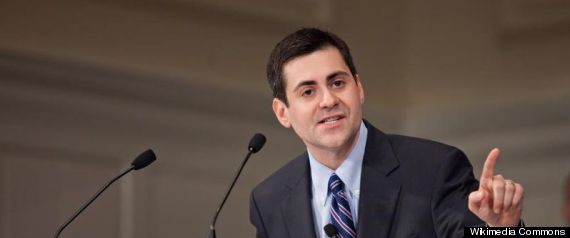[soundcloud url=”https://api.soundcloud.com/tracks/119625540″ width=”100%” height=”166″ iframe=”true” /]
Videos by Rare
Religion and politics, separation of Church and state, freedom of religion — can the power of religion change politics for the better?
Kurt Wallace for Rare: Religion and politics. Separation of church and state. Freedom of religion. Can the power of religion change politics for the better? Here to discuss is Russell Moore, president of the Southern Baptist Ethics and Religious Liberty Commission. Mr. Moore, thanks for being with us today.
Russell Moore: Good to be with you, Kurt. Thank you for having me.
Kurt Wallace for Rare: Well, first off, tell us about the Southern Baptist Ethics and Religious Liberty Commission.
Russell Moore: Well, it’s a hundred year old agency that exists really to do two things. One of them is to equip churches and Christians to think through ethical issues — everything, abortion and in vitro fertilization, all the way over to how we conduct our church business meetings in an ethical way to how we deal with sermon plagiarisms to how we think about horror films — every aspect of life that has to do with ethical transformation and following Christ. And then secondly, to speak for churches and Christians to the larger culture — not only in terms of advocacy in Washington — Capitol Hill — all those issues that we care about — religious liberty — global persecution of Christians — the right to life, family stability, all of those sorts of issues. But also to the broader culture as well. Why, we as Christians, believe these things matter?
Kurt Wallace for Rare: There was a Wall Street Journal article titled “Evangelical Leader Preaches Pullback From Politics, Cultural Wars.” Could you clarify the confusion that’s been created from this piece?
Russell Moore: Well, what I said to many people is if there had been a reporter present when Jesus said, “Man shall not live by bread alone,” the headline probably would have been “Religious Leader Calls For Pullback From Food.” When in reality, what’s happening is a call to a broader engagement and a more energized engagement but an engagement that is theologically grounded and an engagement that recognizes that the culture is changing around us and we have to, in order to address that, recognize just how bad the situation is on the one hand — and on the other hand, to see the great optimism of the Gospel. We are not losers in the broad sweep of history. If we really believe what the Scripture has told us, then we are ultimately winners in God’s purposes, and I think we ought to reflect that then with a sense of optimism and a hope rather than of pandering.
Kurt Wallace for Rare: How can you play a role in terms of understanding the structure of government in dealing with issues so personal as abortion, gay marriage, and issues that are never really resolved, they just bounce back and forth in Washington D.C.?
Russell Moore: Well, in one sense they are never really resolved. You are right about that. They are not really resolved because we are dealing with a fallen world. And so, unlike secular progressives, we really don’t believe that human nature can be reconstructed by state action. We are always going to be dealing with sin. But that doesn’t mean that we can’t do something. And I think that in one sense we can see a way in which those things have changed quite a bit. I think the pro-life movement is one of the best examples of Christian engagement with the broader culture because the pro-life movement has been operating for forty years now at multiple levels — at the political level, never backing off from the political level at efficacy and working in all sorts of ways in order to seek to protect unborn children in law, but also recognizing that as we’re doing that advocacy, we are seeking to appeal to the culture around us as to why we think this is important. There’s a great deal of attention being given to explaining the humanity of the unborn, why this is important, ministering to women who are in crisis pregnancy, seeking to persuade them not only to keep their children, but also why life is worth living. I think the pro-life movement has been very successful and some people might say, well, it’s not successful because abortion is still legal — that’s true, and we have a long way to go. But think about, if you went back in a time machine forty years ago and said, “What will the pro-life movement look like in the year 2013,” I think most of the abortion rights advocates at the time would have laughed and would have said, “There will be no pro-life movement in the year 2013, because we will have succeeded.” That didn’t happen. And it didn’t happen because the pro-life movement was able to engage every successive younger generation with why this was important, and I think specifically, as an evangelical Christian, the most important reason for that is because the evangelical wing of the pro-life movement has demonstrated how this is a Gospel issue — this isn’t some incidental issue thing that we’re doing. It has everything to do with our mission that Jesus has given to us.
Kurt Wallace for Rare: So in terms of this, the focus isn’t to try to legislate morality but to promote these aspects of the human condition.
Russell Moore: Well, I think legislating morality is something we have no choice but to do. Everyone is legislating a particular moral vision. So we do need to legislate a moral vision when it comes to, for instance, the protection of vulnerable, unborn children. They need to seek to make abortion illegal. That’s a matter of simple justice, but as we’re doing that, we’re demonstrating why this is important. This is important because this isn’t some abstract choice. This is a human being. This is our neighbor and so we recognize and understand that even as we’re doing political advocacy, we’re not only speaking to the legislators and to the Supreme Court — we’re also speaking to those young women and those young men who are going to be walking into those fortune clinics and seeking to appeal to them, “Don’t do this. This is something that is destructive not only of the unborn child who was your neighbor but also of your own conscience, and the human social fabric itself.” So we do seek to legislate, but we recognize that we cannot bring in the kingdom of God through legislation. We’re never Utopians. As conservatives, we recognize we are always going to be living in a fallen world and we’re always fighting against that fallenness and that darkness. And if we don’t see it, it only means we’ve succumbed to it. So we have a very open eyeview of what’s going on around us at the same time that we recognize the power of the Gospel and the power of life of Christ.



